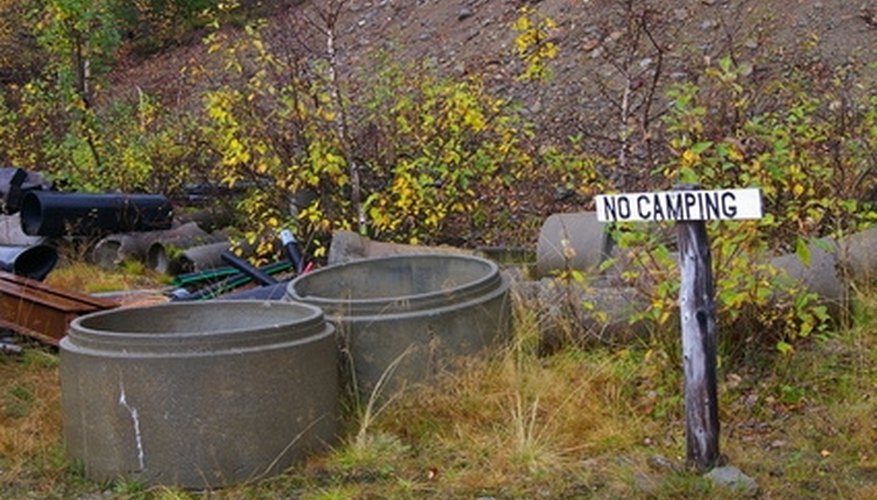
There is a right time and place for everything, and that includes camping. Trying to camp on private property without knowing what laws are in effect could land you in a world of trouble. If you are violating the law, intentionally or not, at the very least you will be asked to leave; at the very worst, you will be forcefully removed by the authorities. Knowing the laws before you camp out saves you a a lot of entanglements with the judicial system.
Landowner's Permission
Before you camp on private property, you must have the landowner's permission, preferably in writing. If the landowner sees you camping on his land without permission, then you are trespassing. According to Mother Earth News, even if there is no "No Trespassing" sign posted, you are still committing an illegal act by trespassing. He has a right to call local law enforcement to have you removed from the land, and you have to comply with the authorities. Furthermore, he (and law enforcement) can require you to clean up the litter and campfires you built and return the land to a pre-camping condition before you leave.
Zoning Laws
Zoning laws, which supersede owners rights laws, may not allow camping on a certain area, even if you have the landowner's permission. For example, the City of Woodland, California, has stated that it is unlawful to camp on private property within the city limits, whether in tents, shacks, trailers, or any other temporary shelter. The law further states that violators of this ordinance will be charged with a misdemeanor. Another city in California, Vacaville, states that camping within the city limits, whether on private or public property, is a public nuisance and illegal. If you do not have an exemption under Title 14 of the code for camping on private property, then Vacaville states you are guilty of a misdemeanor. Every state, county, or city has its own set of zoning laws on camping, and these can vary greatly from region to region.
Liability Laws
There are liability laws to consider if you are injured while camping. For example, the State of New York has the General Obligations Law, which states that landowners have freedom from liability from nonpaying recreationalists. If you paid rent to the landowner to set up a trailer to camp, then different liability laws may apply. Like zoning laws, every state or municipality has its own set of laws concerning liability, and again these can vary greatly from state to state or county to county.
Recommendations
Check with the local zoning board to verify that setting up a trailer and camping is allowed on the land. After this, bear in mind that most communities have noise, campfire, and trash ordinances, such as Traverse City, Michigan's noise ordnance noted in Noise Pollution Clearinghouse. You should familiarize yourself with and abide by all the prevailing laws before camping.
References
Writer Bio
Tony Oldhand has been technical writing since 1995. He has worked in the skilled trades and diversified into Human Services in 1998, working with the developmentally disabled. He is also heavily involved in auto restoration and in the do-it-yourself sector of craftsman trades. Oldhand has an associate degree in electronics and has studied management at the State University of New York.



